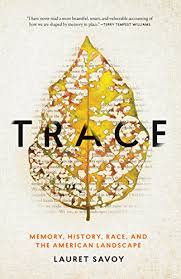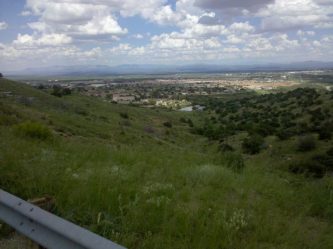Rocks and race…

Where did your ancestors come from? Living in a country of immigrants (both forced and consensual), it’s a pretty common question in the USA. What if you don’t know? What if your ancestry is shrouded in a mist of slavery and expropriation? As everyone knows, history is written by those in power and if your ancestors came to America in chains or were driven off their ancient homelands by the US Army, much of your family history has been whitewashed, appropriated or simply buried. Driven by a tireless existential need, geologist Lauret Savoy, a woman of mixed heritage, tries to fill in some of the blanks in Trace. It turns out to be a fascinating journey.
She doesn’t have a lot to go on. Nonetheless, she travels the country, exploring the landscape and digging into archives. From a South Carolina plantation to the Arizona borderlands, she searches for any useful clues, eventually returning to the nation’s capital to explore its unique role in the slave trade. All along the way, she unravels countless intriguing chronicles about people and their surroundings.

Now I don’t read everything out there, but it’s my impression that there aren’t a lot of geologists writing critically-acclaimed social commentary. Nonetheless, this Mount Holyoke College professor has a unique ability to seamlessly blend the ancient natural details of a landscape with the story of the humans who have briefly appeared there. It makes for really interesting reading and provides a profoundly unique view of one individual’s American experience.

Having been a brief resident of Fort Huachuca, Arizona in the 1960s – as a newborn baby – I found Savoy’s detailed history of the remote western outpost particularly interesting. At times it almost reads like a Twilight Zone episode, as she describes the endless machinations required to make sure that white people, black people and red people all stayed in their proper places.
It’s not always obvious, but it’s impossible to write about a country or its inhabitants without geology being omnipresent. Writers may choose to ignore it – out of ignorance or apathy – but it’s still true. In Trace, Savoy revels in this reality, providing deep descriptions of the landscapes she encounters that add a rarely appreciated layer to her cross-country narrative of personal history and discovery. Highly recommended.
— D. Driftless
I found this book while spending a few hours at the Elliott Bay Book Company, Seattle’s celebrated reader’s mecca. I can’t wait to go back sometime soon.
Check out some of Dave’s reviews of other recent works on race in the United States of America: Between the World and Me / Writing to Save a Life / Blood Done Sign My Name
[AMAZONPRODUCTS asin=”1619028255″]
- Best Non-Fiction of 2016 - February 1, 2017
- Little Free Library Series — Savannah - May 22, 2015
- Little Free Library Series — Wyoming - November 30, 2014

